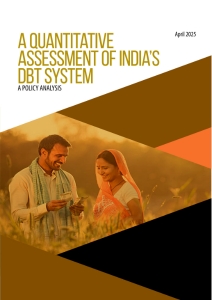The National Statistical Office (NSO) has released the Time Use Survey (TUS) 2024, capturing how Indians spend their daily 1,440 minutes on work, care, and personal activities. The data highlights workforce patterns, gender gaps, and evolving social dynamics. Globally, such surveys are key tools for informed policy-making.
Over the past decade, one recurring theme in policy discourse has been the challenge of delivering money efficiently, without loss or delay. In rural India, where every rupee counts, this issue becomes especially critical. The Direct Benefit Transfer (DBT) platform emerged as a game-changing solution, channeling funds directly from the government to farmers’ bank accounts.
India’s defence sector has undergone a strategic transformation since 2014, marked by a strong push for indigenous production and self-reliance under the Aatmanirbhar Bharat initiative. This paper provides a data-driven analysis of trends in defense expenditure, industry performance, and modernization initiatives and outlines recommendations to further bolster India’s national security and regional influence.

By Bluekraft
This report contrasts the divergent economic paths of India and Pakistan. While Pakistan reels from economic instability, foreign bailouts, and the fallout of sponsoring cross-border terrorism, India surges ahead as the world’s fastest-growing major economy, driven by bold reforms and a long-term vision.
India’s Direct Benefit Transfer (DBT) system, implemented in 2013, has redefined welfare delivery by enhancing transparency, curbing leakages, and ensuring precise fund distribution. This policy document evaluates a decade of data (2009–2024) to assess DBT’s impact on budgetary efficiency, subsidy rationalization, and social outcomes.

By Bluekraft
India is boosting its chip industry to ensure supply continuity, critical infrastructure security, and technological sovereignty. With billions invested, the strategy is threefold: self-sufficiency in semiconductors for key sectors, partnerships with global leaders to strengthen supply chains, and empowering MSMEs to create jobs and support manufacturing. This push secures resilience and economic growth.












